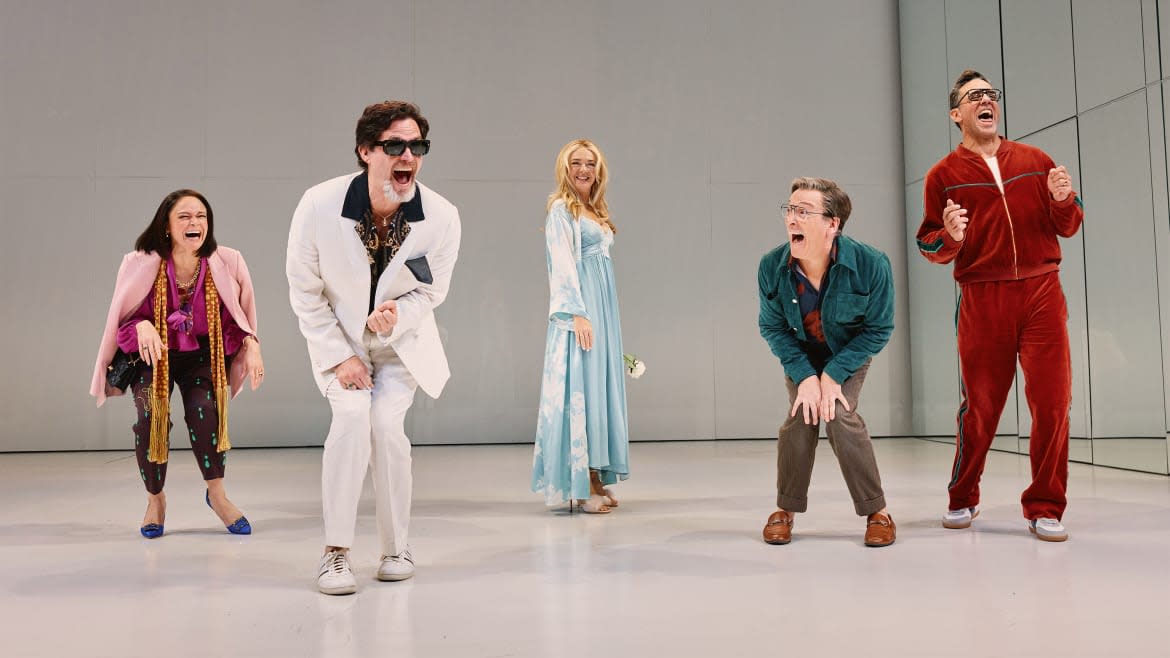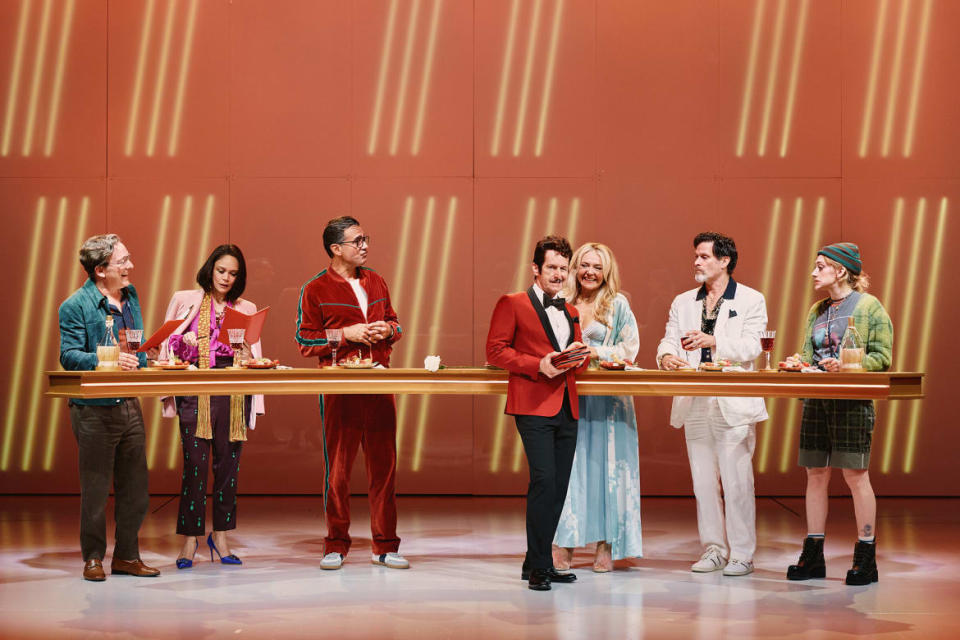Review: ‘Here We Are’ Is Stephen Sondheim’s Fractured Farewell

Of course it is impossible to separate Stephen Sondheim and his death, at 91 in November 2021, from Here We Are (The Shed, to Jan. 21). This is the final work he wrote music and lyrics for; for one, death interrupted its completion, so it is a specter at the feast in a musical about an ever-deferred feast.
And then, well, this is Sondheim. Theater-makers often talk about the important role of an audience when it comes to the performance of a work, and that invisible cord to the stage is even more tangible and freighted here as his fans and appreciators take their seats to watch the final artistic expression of the master of musical theater. If one cannot attend a funeral or wake or reception, this is an ideal and active way to pay your homage. Indeed, at one moment during Here We Are a character describes having a dream, of being on stage and being watched by an audience. The lights come up. Suddenly both cast and watchers blink at each other directly and nervously, the comfortingly separating screen of fiction momentarily blasted away.
Up Close and Very Personal With the Real Stephen Sondheim
Because of Sondheim’s death, the musical component of Here We Are itself was left unfinished (its book is by David Ives, Joe Mantello directs). The songs peter out meaningfully at the beginning of the second act, and from then on we just have the book and attractive underscoring by Jonathan Tunick (Alexander Gemignani oversees musical supervision and additional arrangements). Another intriguing knot to untangle is that this is based on two Luis Buñuel films, The Discreet Charm of the Bourgeoisie and The Exterminating Angel.
Here We Are does not share Buñuel’s tone of serrated satire. Yes, the lead characters are a group of very rich people, blithely and apparently dangerously unaware of their own privilege. This lack of awareness, the warm bath of their own wealth, is only lightly skewered—even in the second act, where trapped in a room, they end up with nothing apart from a Ming to piss in, and the rumbles of a bigger apocalypse flashing orange outside. This isn’t class warfare, it’s a far bigger end that the rich have brought on all of us; and their presence—as the both imprecise and underwhelming title of the show enshrines—is ultimately affirmed rather than undermined.
Buñuel emphasized the shadow of savagery ever present beneath surface finery and politesse; Here We Are only flirts with such literal and allegorical griminess. Some elements of the source material—like drugs trafficking being investigated by a Colonel (Francois Battiste)—are un-memorably and clumsily repurposed.
Despite a stellar, awards-laden Broadway cast, it is hard to build up that many strong feelings about Marianne Brink (Rachel Bay Jones) and her husband Leo (Bobby Cannavale), and their friends Claudia Bursik-Zimmer (Amber Gray) and Paul Zimmer (Jeremy Shamos), and Raffael Santello Di Santicci, the always-horny Ambassador to somewhere called Moranda (Steven Pasquale), whose residence the group adjourns to in the second act.
How did this all begin? “Brunch,” someone says later, and it is indeed fun to have the search for the right brunch as the main vehicle in the first act: a perfect target of satire of our times. Indeed, the musical's first excellent song is given to Denis O’Hare playing a waiter at ‘Cafe Everything’ who reveals that far from having everything, the venue has nothing, including water. “We do expect a little latte later,/But we haven’t got a lotta latte now.”

l to r: Jeremy Shamos, Amber Gray, Bobby Cannavale, Denis O'Hare, Rachel Bay Jones, Steven Pasquale, and Micaela Diamond in 'Here We Are.'
The main character group are written so lightly and unconvincingly as partners and friends (you simply do not buy they are either) that you feel nothing beyond: “Sure, let’s go on this ride together,” feeling from the outset that no deep emotional investment is going to be required. The ultimate mark of Marianne and Leo’s indolence and indulgence is that they will clone their beloved dogs, so they can have the same creatures present at each of their properties.
This isn’t to say the actors’ performances, or the staging, are poorly conceived—you can see the company trying to color as much as they can in, and reach into the roles. Jones is languidly ethereal as Marianne, swooshing around the stage in her nightwear in thrall to the adventure unfolding around her. As far as she is concerned the group is “blessed,” full stop. Her dance with—let’s say a stranger, to avoid spoilers—in the second act is as odd and surreal as intended.
A more mysterious character, Fritz, or Fritzy (Micaela Diamond) is Marianne’s sister, and introduced to us as a lesbian; a joke is then made at her expense about her gender identity. She appears to be a revolutionary, embarrassed by the group’s wealth and shared disregard of the world around them. The end of the world is coming for all of them, she says—"The world of Wall Street thieves and fashionistas/And Lamborghinis and Vodkatinis—/It’s all so over! Don’t you know that?”
Then she suddenly falls for a male soldier, played by Jin Ha—and whether she remains radical, or gives that up, or what she cares about or doesn’t care about is thrown into the breeze. Their declared love for each other is immediate and fulsomely expressed. It all seems absurd, and is played for absurdity. The character insists she’s “exploring,” but the musical doesn’t accord her that much of a respectful or intelligible voyage.
Tracie Bennett is a constant joy, playing a range of characters who retreat into backgrounds, or disappear into the canvass, yet who remain comical goldmines. As a French waitress she suddenly launches into a torch song, also unable to feed the group: Sometimes you want too much,/Too soon—/And then it’s too late./But what can you do/If that’s on your plate?”
Later, another character outside the main group has another excellent song; David Hyde Pierce playing a bishop with a thing for glamorous women's shoes somehow finds the perfect balance of comedy and feeling within his character. “Don’t get me wrong,/I love the church,/And I don’t only mean the clothes,/I mean the statues and the windows/And the rows of yearning people/And the special parking/And oh, the music—!/What else to call it but ‘divine’/And then of course, there’s God.”

The company of 'Here We Are' at The Shed, NYC.
Hyde Pierce delivers his lines as sharp meditations, or satisfyingly self-shaped puzzles that he answers waspishly. In a nod to Buñuel, he imagines a new life as a cook in a country house, “with a fabulous terrace.” (Hyde Pierce, like Bennett and O’Hare, really knows how to read and play Sondheim.) Later, in a lovely scene, the bishop and Marianne—by now so hungry they’re eating the pages of a copy of A Tale of Two Cities—come to the conclusion that life is about being here until we are not; Marianne alighting on a meaning of the repeated phrase “To be continued” that truly has weight.
O’Hare returns as the group’s nemesis, Inferno, a revolutionary out to torture the rich, but the sense of danger he could represent is filtered and neutered. His captives don’t seem that transformed by his menace. As a feverish Leo bellows: “I do not apologize for ANYTHING! I say screw this stinking world, I say screw this filthy universe. I’m just glad I won’t be here to see the extermination. The hell with food! The hell with friends! The hell with restaurants and menus and Beef Bordelaise! The hell with it all!”
These non-imperiled characters come and go on a stage designed by David Zinn that is first a shiny surface to echo the shallowness and ease and breeze of its rich protagonists. Later, he imagines a more conventionally sumptuous setting for the Morandan embassy. Mantello and choreographer Sam Pinkleton keep everyone in visually engaging flurries of movement, as we imagine the car driving and restaurants the group tumble into and out of—and finally their debasing incarceration.
As in The Exterminating Angel, the characters find it impossible—as if there is a repelling forcefield—to cross the threshold of what is here imagined as Santicci’s embassy (where they end up, all restaurant options exhausted), even if they ultimately find water by tapping at some pipes.
Here We Are determinedly remains an ironic-feeling lark, despite its implied intent to dig deeper. The characters do not really go through hell. In other pieces, like Into the Woods and the recent, masterfully revived Merrily We Roll Along, Sondheim combines a sharp eye on all manner of behavior, foibles and humanity with a capacity to make us really care about the Baker and his wife, or the trio of friends in Merrily somersaulting backwards through time away from an unhappy ending to their happy beginning.
Here We Are, mostly and regardless of some lovely performances, leaves no profound emotional impression at its end. It sure tries. When in its closing seconds the characters tell us what their experience meant to them, it feels like a stab at redemption and learning that comes across as more puzzling overshare, because for most of the production has not sketched any kind of ongoing emotional or psychological impact of their various trials and tribulations. It is so bizarre and rushed. Why do this now? What have they recognizably gone through, who have they been to each other in front of us, to suddenly reveal this stuff?
The final sequence of The Discreet Charm of the Bourgeoisie is echoed in the final seconds of Here We Are. It is a flash of collective movement, and at first a repeated sequence throughout the show of the group walking—in the show, different characters have tried and failed to lead the group or lead the moment when the group walks forward. Here, at the end, is an expression of freedom in unison, rather than the imagined confinements of the characters we have witnessed for the past two-plus hours. Finally, they’re striking out into the world, normality somehow and inexplicably restored. The problem is, in what we have watched, they never seemed that confined.
Here We Are is a stylish and committed production of an incomplete, flawed work. That is no terrible thing; scraps of wonderful Sondheim are still worth more than much other theater. Here We Are has its pleasures, jollities, and moments that pierce, and it is certainly a very real way to say goodbye to an artist whose death interrupted its completion. This work, like its characters in that last second, remains necessarily in motion, blurred, frozen mid-expression—but it is on its way, going forward, still fiercely finishing the hat to the very end.
Get the Daily Beast's biggest scoops and scandals delivered right to your inbox. Sign up now.
Stay informed and gain unlimited access to the Daily Beast's unmatched reporting. Subscribe now.


